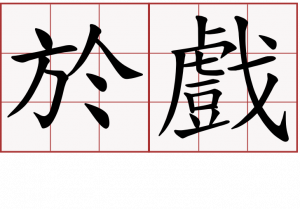Language/Literary-chinese/Vocabulary/於戲
This word is a particle of sigh, or means that someone dies.
It is written as 於戲 and pronunced as 鳴呼 (wūhū in Mandarin), which is always confusing. Sometimes it is also written in other forms, such as 於乎.
秀才詰問和尚曰:「你們經典內『南無』二字,只應念本音,為何念作那摩?」僧亦回問云:「相公,《四書》上『於戲』二字,為何亦讀作嗚呼?如今相公若讀於戲,小僧就念南無。相公若是嗚呼,小僧自然要那摩。」 ——《笑林廣記·第二卷腐流部·僧士詰辯》
有蒙訓者,首教《大學》,至「於戲前王不忘」句,竟如字讀之。主曰:「誤矣,宜讀作嗚呼。」師從之。至冬間,讀《論語》注「儺雖古禮而近於戲」,乃讀作鳴呼。主人曰:「又誤矣,此乃於戲也。」師大怒,訴其友曰:「這東家甚難理會,只『於戲』兩字,從年頭直與我拗到年尾。」 ——《笑林廣記·第二卷腐流部·於戲左讀》
In Li Bai's poet 《蜀道難》, the first seentence is "噫吁嚱!危乎高哉!蜀道之難,難於上青天!".
噫吁嚱 is considered as a sigh, and it's pronunced in Mandarin as yīxūxì.
Howevery, it is hard to believe that a sigh can be so unnatural, so maybe 吁嚱 is another form of 於戲, and 噫吁嚱 should be pronunced as yīwūhū.
Thread of discussion - https://www.zhihu.com/question/27517816

